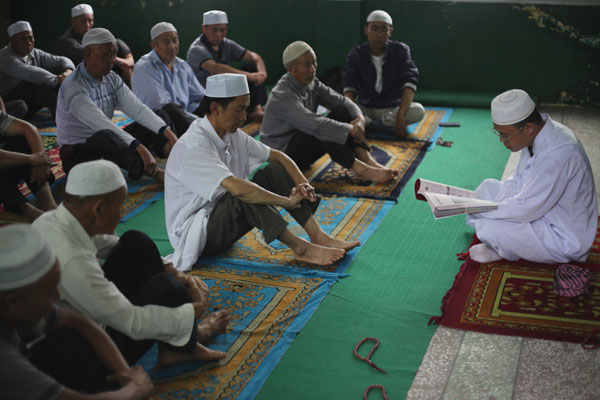Martial arts and Arabic
Every summer, the imams at the mosque organize Arabic classes for local children. Although Arabic is the Huis' traditional tongue, it's rarely used in daily life, except during Salah, prayers undertaken five times a day, weddings, or funerals. In addition to learning Arabic, the children also practice Hui martial arts, which have been included in a list of Yiyang's intangible culture heritage.
When the drizzle stopped temporarily, four men wearing yellow satin costumes performed one maneuver each. Despite their slightly protruding bellies, the men's movements were fluid and powerful.
"In the past, the Hui practiced martial arts to protect ourselves, but now we do it for the good of our health," said Li Saijun, chairman of the Taojiang's Islamic Association.
One of the performers, Li Shengjun, 38, started learning traditional Hui martial arts at the age of seven, taught by masters from the villages around the mosque. "At the time, I didn't like school, and I frequently skipped it to study martial arts. It's odd that I fought a lot with other kids, and even became a problem child, but now practicing martial arts is seen as being good for our health," he said, with a chuckle.
In the early 1990s, martial arts became hugely popular in China after a raft of movies and television shows featured masters of various disciples. As a result, clubs sprang up in towns and cities around the country.
When Li Shengjun was 18, he started his first club, in Taojiang's downtown area. In the years that followed, he regularly recruited 200 students, aged between 4 and 15, every year. They came from both the Hui and Han groups.
"Traditionally, we don't usually teach our skills to non-Hui people or to women, but in my club, I broke the rule. Fifty percent of my students are Han, and there are about 12 girls, some of whom are pretty good," he said. "The Han students know I'm a Muslim and respect my beliefs. If their parents invite me to dinner, they know that there are certain foods I'm forbidden to eat."
In the mid-1990s, when the passion for martial arts began to cool, business slowed. The slowdown was exacerbated by the 1997 Asian financial crisis. People had no money to spare for non-essentials such as martial arts, and by 1999, Li Shengjun had just five students.
His club was in the downtown area and his home was in a village more than 70 kilometers away, so one day, when he had to return home, he realized that he didn't have a penny to his name, so he walked the entire distance. "I got up at 6 am and arrived at home at midnight," he said.
The street where he started out was once home to more than 10 clubs, but by 1999 the masters had all sold up and moved into more lucrative lines of business, leaving Li Shengjun's club as the only one in existence.
"I love martial arts, and I have some talent. I don't want to do anything else, so I have persevered. I have devoted my whole life to my club, which is now the most influential in Taojiang. The martial arts are a very good thing," he said.
 |
|
Li Saijun, the imam, chants from the Quran in Arabic, at the Friday Salah at the only mosque in Taojiang county, Hunan province. [Photos by Wang Jing / China Daily]
|
In May 2013, he led the first Hui martial arts team from Hunan to compete in a tournament in Taiwan. The team, the only one in the competition from an ethnic group, won seven gold medals, three silver and three bronze. It also took first place at the East Asia Martial Arts Competition in Beijing, by winning seven first-grade awards.
At this year's competition, held in May in Guilin in the Guangxi Zhuang autonomous region, the team beat its own record by winning eight events. Li Shengjun has won more than 20 gold medals in various competitions in recent years. "Later this year, we will become the first team from Hunan to compete in the World Martial Arts Tournament," he said, standing in front of the blue-and-white-tiled mosque.
On a rain-drenched morning, Huang Hui, 25, drove to the mosque from his home in Changde, several kilometers away, to attend Friday prayers, the most important religious activity of the week. The mosque's grand hall, where Salah is usually held, was having new ceilings fitted, so the meeting was moved to a smaller room.
We recommend:
